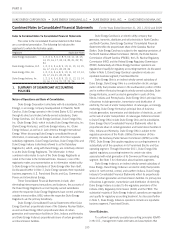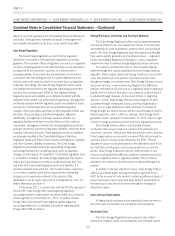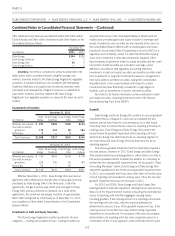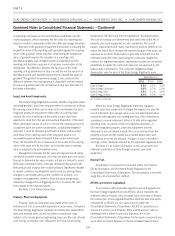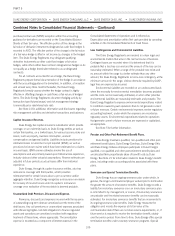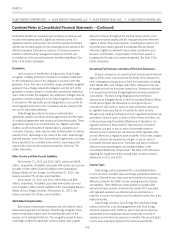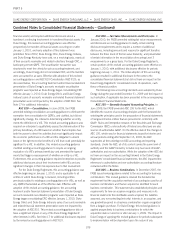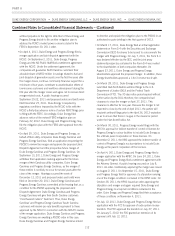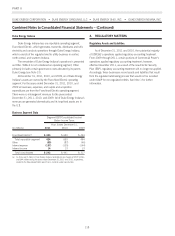Duke Energy 2011 Annual Report Download - page 130
Download and view the complete annual report
Please find page 130 of the 2011 Duke Energy annual report below. You can navigate through the pages in the report by either clicking on the pages listed below, or by using the keyword search tool below to find specific information within the annual report.
PART II
DUKE ENERGY CORPORATION •DUKE ENERGY CAROLINAS, LLC •DUKE ENERGY OHIO, INC. •DUKE ENERGY INDIANA, INC.
Combined Notes to Consolidated Financial Statements – (Continued)
transactions within the scope of ASC 805. The revised guidance of
ASC 805 changed the accounting for income taxes related to prior
business combinations, such as Duke Energy’s merger with Cinergy.
Effective January 1, 2009, the resolution of any tax contingencies
relating to Cinergy that existed as of the date of the merger are
required to be reflected in the Consolidated Statements of Operations
instead of being reflected as an adjustment to the purchase price via
an adjustment to goodwill.
ASC 810. In December 2007, the FASB amended ASC 810 to
establish accounting and reporting standards for the noncontrolling
(minority) interest in a subsidiary and for the deconsolidation of a
subsidiary and to clarify that a noncontrolling interest in a subsidiary is
an ownership interest in a consolidated entity that should be reported
as equity in the consolidated financial statements. This amendment
also changed the way the consolidated income statement is presented
by requiring consolidated net income to be reported at amounts that
include the amounts attributable to both the parent and the
noncontrolling interest. In addition, this amendment established a
single method of accounting for changes in a parent’s ownership
interest in a subsidiary that do not result in deconsolidation. For the
Duke Energy Registrants, this amendment was effective as of
January 1, 2009, and has been applied prospectively, except for
certain presentation and disclosure requirements that were applied
retrospectively. The adoption of these provisions of ASC 810 impacted
the presentation of noncontrolling interests in the Duke Energy
Registrants’ Consolidated Financial Statements, as well as the
calculation of the Duke Energy Registrants’ effective tax rate.
ASC 815 — Derivatives and Hedging. In March 2008, the
FASB amended and expanded the disclosure requirements for
derivative instruments and hedging activities required under ASC
815. The amendments to ASC 815 requires qualitative disclosures
about objectives and strategies for using derivatives, volumetric data,
quantitative disclosures about fair value amounts of and gains and
losses on derivative instruments, and disclosures about credit-risk-
related contingent features in derivative agreements. The Duke
Energy Registrants adopted these disclosure requirements as of
January 1, 2009. The adoption of the amendments to ASC 815 did
not have any impact on the Duke Energy Registrants’ consolidated
results of operations, cash flows or financial position. See Note 14 for
the disclosures required under ASC 815.
ASC 715 — Compensation — Retirement Benefits. In
December 2008, the FASB amended ASC 715 to require more
detailed disclosures about employers’ plan assets, concentrations of
risk within plan assets, and valuation techniques used to measure
the fair value of plan assets. Additionally, companies will be required
to disclose their pension assets in a fashion consistent with
ASC 820 — Fair Value Measurements and Disclosures (i.e., Level 1,
2, and 3 of the fair value hierarchy) along with a roll-forward of the
Level 3 values each year. For the Duke Energy Registrants, these
amendments to ASC 715 were effective for the Duke Energy
Registrants’ Form 10-K for the year ended December 31, 2009. The
adoption of these new disclosure requirements did not have any
impact on the Duke Energy Registrants’ results of operations, cash
flows or financial position. See Note 21 for the disclosures required
under ASC 715.
The following new Accounting Standards Updates (ASU) have
been issued, but have not yet been adopted by Duke Energy, as of
December 31, 2011:
ASC 820 — Fair Value Measurements and Disclosures. In
May 2011, the FASB amended existing requirements for measuring
fair value and for disclosing information about fair value
measurements. This revised guidance results in a consistent
definition of fair value, as well as common requirements for
measurement and disclosure of fair value information between U.S.
GAAP and International Financial Reporting Standards (IFRS). In
addition, the amendments set forth enhanced disclosure
requirements with respect to recurring Level 3 measurements,
nonfinancial assets measured or disclosed at fair value, transfers
between levels in the fair value hierarchy, and assets and liabilities
disclosed but not recorded at fair value. For the Duke Energy
Registrants, the revised fair value measurement guidance is effective
on a prospective basis for interim and annual periods beginning
January 1, 2012. Duke Energy is currently evaluating the potential
impact of the adoption of this revised guidance and is unable to
estimate at this time the impact of adoption on its consolidated results
of operations, cash flows, or financial position.
ASC 220 — Comprehensive Income. In June 2011, the FASB
amended the existing requirements for presenting comprehensive
income in financial statements primarily to increase the prominence of
items reported in other comprehensive income (OCI) and to facilitate
the convergence of U.S. GAAP and IFRS. Specifically, the revised
guidance eliminates the option currently provided under existing
requirements to present components of OCI as part of the statement of
changes in stockholders’ equity. Accordingly, all non-owner changes in
stockholders’ equity will be required to be presented either in a single
continuous statement of comprehensive income or in two separate but
consecutive financial statements. For the Duke Energy Registrants, this
revised guidance is effective on a retrospective basis for interim and
annual periods beginning January 1, 2012. Early adoption of this
revised guidance is permitted. Duke Energy is currently evaluating the
revised requirements for presenting comprehensive income in its
financial statements and is unable to estimate at this time the impact of
adoption of this revised guidance on its consolidated results of
operations.
ASC 210 — Balance Sheet. In December 2011, the FASB
issued revised accounting guidance to amend the existing disclosure
requirements for offsetting financial assets and liabilities to enhance
current disclosures, as well as to improve comparability of balance
sheets prepared under U.S. GAAP and IFRS. The revised disclosure
guidance affects all companies that have financial instruments and
derivative instruments that are either offset in the balance sheet (i.e.,
presented on a net basis) or subject to an enforceable master netting
110


